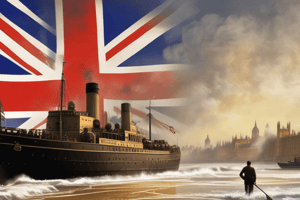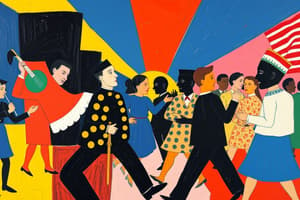Podcast
Questions and Answers
What is a flapper?
What is a flapper?
- A fashion trend
- A rebellious, energetic young woman (correct)
- A type of car
- A type of dance
What are demographics?
What are demographics?
Statistics that describe a population.
What is a barrio?
What is a barrio?
A Spanish-speaking neighborhood.
Which group suffered economically during the 1920s?
Which group suffered economically during the 1920s?
Which ethnic group moved in large numbers from rural to urban areas during the early 20th century?
Which ethnic group moved in large numbers from rural to urban areas during the early 20th century?
Why were there fewer Asian immigrants during the 1920s?
Why were there fewer Asian immigrants during the 1920s?
Who was the first female to fly across the Atlantic Ocean in 1928?
Who was the first female to fly across the Atlantic Ocean in 1928?
Why did African Americans migrate north in the early 1900s?
Why did African Americans migrate north in the early 1900s?
Where did many rural people move to during the 1920s with the advent of the automobile?
Where did many rural people move to during the 1920s with the advent of the automobile?
The female flapper of the 1920s was more image than reality.
The female flapper of the 1920s was more image than reality.
In the 1920s, trolleys to the suburbs were largely replaced by which mode of transportation?
In the 1920s, trolleys to the suburbs were largely replaced by which mode of transportation?
In the 1920s, the status of women in the workplace:
In the 1920s, the status of women in the workplace:
Who was Jim Thorpe?
Who was Jim Thorpe?
Flappers danced the Charleston, a new dance that embodied the spirit of which era?
Flappers danced the Charleston, a new dance that embodied the spirit of which era?
In Charles Lindbergh and other heroes, Americans recognized:
In Charles Lindbergh and other heroes, Americans recognized:
Who became a national hero after flying nonstop from New York to Paris?
Who became a national hero after flying nonstop from New York to Paris?
What is mass media?
What is mass media?
What does the term Jazz Age refer to?
What does the term Jazz Age refer to?
What is the Lost Generation?
What is the Lost Generation?
What was the Harlem Renaissance?
What was the Harlem Renaissance?
Stereotypes were common in the 1920s.
Stereotypes were common in the 1920s.
Flashcards
Flappers
Flappers
Young, rebellious women known for short hair and energetic dances, symbolizing a break from tradition.
Demographics
Demographics
Statistical data about a population's characteristics, such as race and income.
Barrio
Barrio
A Spanish-speaking neighborhood, often formed by immigrants from Mexico and Central America.
Farmers’ Economic Struggles
Farmers’ Economic Struggles
Signup and view all the flashcards
Migration Trends
Migration Trends
Signup and view all the flashcards
Asian Immigration Restrictions
Asian Immigration Restrictions
Signup and view all the flashcards
Amelia Earhart
Amelia Earhart
Signup and view all the flashcards
Industrial Boom's Impact
Industrial Boom's Impact
Signup and view all the flashcards
Urban to Suburban Migration
Urban to Suburban Migration
Signup and view all the flashcards
The Flapper Myth
The Flapper Myth
Signup and view all the flashcards
Trolley Replacement
Trolley Replacement
Signup and view all the flashcards
Women’s Workplace Status
Women’s Workplace Status
Signup and view all the flashcards
Jim Thorpe
Jim Thorpe
Signup and view all the flashcards
Charleston Dance
Charleston Dance
Signup and view all the flashcards
Cultural Aspirations
Cultural Aspirations
Signup and view all the flashcards
Charles Lindbergh’s Achievement
Charles Lindbergh’s Achievement
Signup and view all the flashcards
Mass Media Emergence
Mass Media Emergence
Signup and view all the flashcards
Jazz Age Definition
Jazz Age Definition
Signup and view all the flashcards
Lost Generation
Lost Generation
Signup and view all the flashcards
Harlem Renaissance
Harlem Renaissance
Signup and view all the flashcards
Study Notes
Key Terms and Concepts from the 1920s
-
Flappers: Young women known for their rebellious fashion, characterized by knee-length dresses, bobbed hair, and energetic dance styles. Symbolized a break from traditional female roles.
-
Demographics: Statistical data representing characteristics of a population, including race and income, critical for economic and marketing analysis.
-
Barrio: A Spanish-speaking neighborhood often established by immigrants from Mexico and Central America, particularly in California.
-
Farmers’ Economic Struggles: Farmers faced significant economic challenges during the 1920s, affecting their livelihoods and contributing to broader economic issues.
-
Migration Trends: Significant movement of African Americans from rural areas to urban centers was driven by industrial job opportunities during the early 20th century.
-
Asian Immigration Restrictions: The Immigration Act of 1917 imposed literacy tests and barred immigration from most Asian nations, leading to a decline in Asian immigration in the 1920s.
-
Amelia Earhart: Notable as the first woman to fly solo across the Atlantic in 1928, marking a significant achievement in aviation history.
-
Industrial Boom's Impact: The industrial boom attracted African Americans to the North, seeking better employment and living conditions.
-
Urban to Suburban Migration: The rise of automobiles encouraged city dwellers to move to suburbs, reflecting changing living patterns.
-
The Flapper Myth: The image of a flapper often exaggerated the reality of women's experiences and societal attitudes in the 1920s.
-
Trolley Replacement: In the 1920s, trolleys serving suburbs were largely replaced by buses, showing the evolution of public transportation.
-
Women’s Workplace Status: Despite some advancements during World War I, the status of women in the workplace saw little significant change in the 1920s.
-
Jim Thorpe: A celebrated Native American athlete, known for winning Olympic gold medals and professional football success.
-
Charleston Dance: The Charleston symbolized the carefree spirit of the Jazz Age, associated closely with flappers and the evolving cultural landscape.
-
Cultural Aspirations: Figures like Charles Lindbergh epitomized a national admiration for heroism and the allure of fame during the era.
-
Charles Lindbergh’s Achievement: Gained fame as the first person to fly nonstop from New York to Paris, representing American innovation and courage.
-
Mass Media Emergence: Gained prominence in the 1920s as a means of mass communication, influencing public opinion through radio and print.
-
Jazz Age Definition: Coined by author F. Scott Fitzgerald, representing the cultural explosion and vibrant musical scene of the 1920s.
-
Lost Generation: A group of American writers disillusioned by the materialism and moral decline of society, often seeking refuge in Europe.
-
Harlem Renaissance: A flourishing of African American artistic expression in the 1920s, highlighting cultural pride and creativity centered in Harlem.
Studying That Suits You
Use AI to generate personalized quizzes and flashcards to suit your learning preferences.




